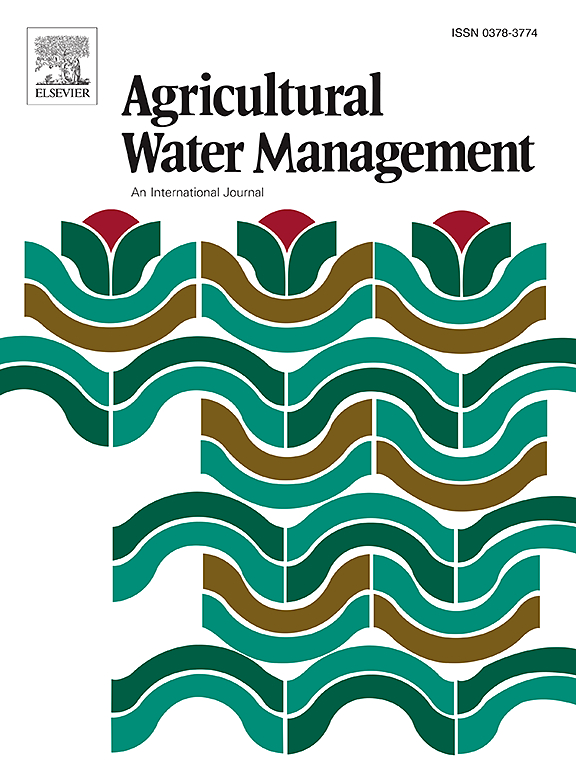Adaptations in agricultural water management in arid regions: Modelling farmer behaviour and cooperation on irrigation sustainability in Morocco
IF 6.5
1区 农林科学
Q1 AGRONOMY
引用次数: 0
Abstract
Climate change has disrupted weather patterns and heightened drought risks in arid and semi-arid regions, requiring adaptations to crop and irrigation strategies to sustain food production. This study integrates qualitative and quantitative approaches to examine the factors influencing farmers crop and irrigation management decisions, with a focus on groundwater management and drip irrigation adoption. Semi-structured interviews 70 farmers from Al Haouz Basin, Morocco provided insights into motivations for crop and irrigation choices. Inductive coding was used for qualitative responses, and data analysis examined how farm size and tenure influenced decision-making. An integrated modelling approach combining the theory of planned behaviour and structural equation modelling (SEM) was used to interpret drivers of irrigation management strategy. The interviews revealed that 83 % of farmers were concerned about groundwater decline, with 40 % identifying salinity as a major challenge. We found that falling groundwater levels and soil salinization have already impacted yields and raised concerns about further declines, prompting large-scale farmers to transition to more profitable and drought-resilient olive cultivation. Analysis of the SEM showed that attitudes toward drip irrigation efficiency, maintaining groundwater supply, and preventing increases in groundwater salinity influence farmers’ intentions regarding their water usage. Additionally, perceived behavioural control played a key role in shaping adoption behaviours, reinforcing the importance of structural and economic factors in decision-making. Land ownership conferred greater long-term perceived control over sustainable water use. However, qualitative findings revealed that cooperation on groundwater management was limited, with many farmers citing a lack of perceived benefits and logistical challenges, highlighting collective action challenges. Complexities related to subsidy applications and land tenure deter drip irrigation adoption, especially among smallholders, constraining climate change resilience. Our study contributes to understanding farmers' coping strategies and presents a foundation from which to develop evidence-based policy reforms enhancing agricultural and water sustainability across arid and semi-arid regions.
干旱地区农业用水管理的适应:为摩洛哥农民行为和灌溉可持续性合作建模
气候变化扰乱了干旱和半干旱地区的天气模式,增加了干旱风险,需要适应作物和灌溉战略,以维持粮食生产。本研究将定性和定量方法结合起来,考察影响农民作物和灌溉管理决策的因素,重点关注地下水管理和滴灌的采用。对来自摩洛哥Al Haouz盆地的70名农民进行了半结构化访谈,深入了解了他们选择作物和灌溉的动机。采用归纳编码进行定性回答,数据分析考察了农场规模和权属对决策的影响。采用计划行为理论和结构方程模型(SEM)相结合的综合建模方法来解释灌溉管理策略的驱动因素。访谈显示,83% %的农民担心地下水下降,40% %的农民认为盐度是主要挑战。我们发现,地下水水位下降和土壤盐碱化已经影响了产量,并引发了人们对产量进一步下降的担忧,促使大规模农民转向更有利可图、抗旱能力更强的橄榄种植。SEM分析表明,对滴灌效率、维持地下水供应和防止地下水盐度增加的态度影响了农民的用水意愿。此外,感知行为控制在形成收养行为方面发挥了关键作用,加强了决策中的结构和经济因素的重要性。土地所有权赋予对可持续用水更大的长期控制。然而,定性调查结果显示,地下水管理方面的合作是有限的,许多农民指出缺乏可感知的利益和后勤方面的挑战,强调了集体行动的挑战。与补贴申请和土地权属相关的复杂性阻碍了滴灌的采用,特别是在小农中,限制了气候变化的适应能力。我们的研究有助于理解农民的应对策略,并为制定基于证据的政策改革提供基础,从而提高干旱和半干旱地区农业和水资源的可持续性。
本文章由计算机程序翻译,如有差异,请以英文原文为准。
求助全文
约1分钟内获得全文
求助全文
来源期刊

Agricultural Water Management
农林科学-农艺学
CiteScore
12.10
自引率
14.90%
发文量
648
审稿时长
4.9 months
期刊介绍:
Agricultural Water Management publishes papers of international significance relating to the science, economics, and policy of agricultural water management. In all cases, manuscripts must address implications and provide insight regarding agricultural water management.
 求助内容:
求助内容: 应助结果提醒方式:
应助结果提醒方式:


